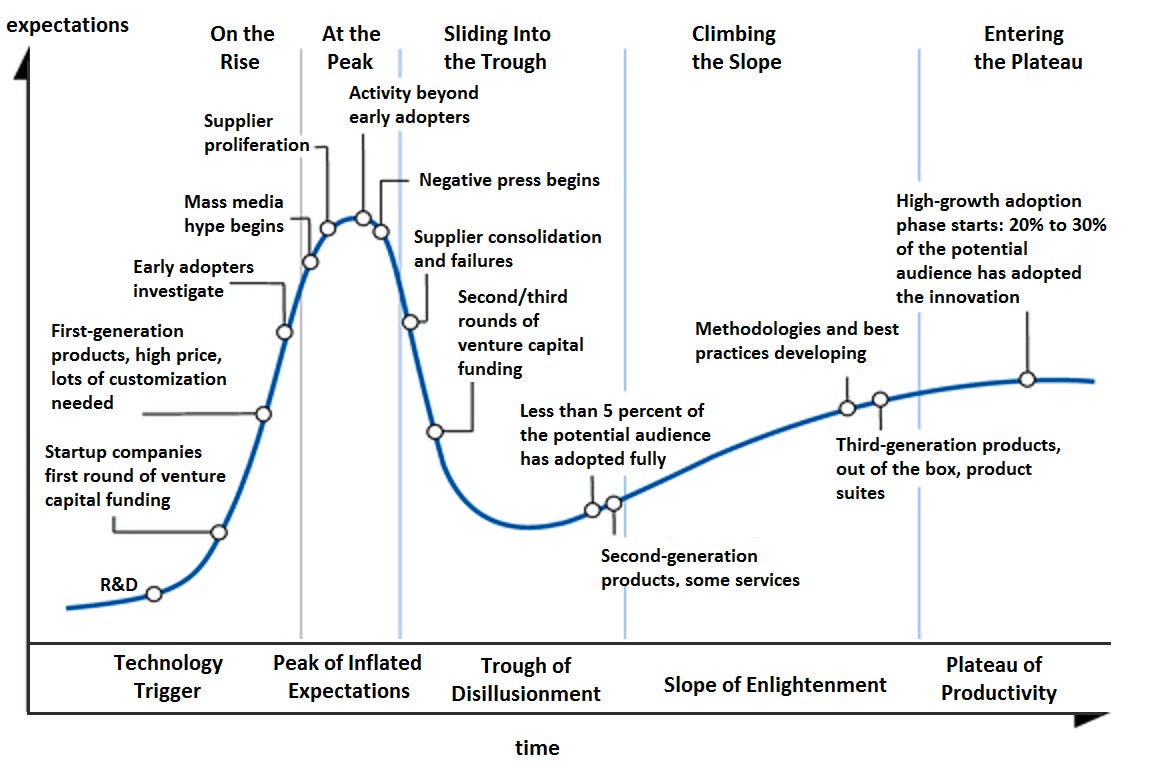We should believe that new tech will change the world, but remember that it may not be in the way or time we think. Just ask the Gartner Hype Cycle.
Is “the Matrix” Around the Corner?
I’m not an expert in Artificial Intelligence (AI) by any means, but I’ve seen so much being discussed online about ChatGPT, AI, and the dire consequences / incredible coming utopia that AI will supposedly usher in that I finally reached out to one of my best friends (a data scientist who works closely with AI folks at FAANG) a question that had been on my mind:
“What things about AI are most interesting / frightening to you / the experts in the field?”
My friend shared a quote about AI that I can only describe as haunting:
“The coders casting these spells have no idea what will stumble through the portal. What is oddest, in my conversations with them, is that they speak of this freely. These are not naifs who believe their call can be heard only by angels. They believe they might summon demons. They are calling anyway.” (source)
My friend then explained that a lot of very smart and persuasive AI experts believe that AI is quickly going to achieve a “general” intelligence (AGI), which will be similar to human intelligence. Not task specific, but good enough at everything to make an AI very similar in intelligence to a human.
He told me that what scares the experts is the idea of a “general” intelligence AI (AGI) slipping into a “super intelligence” AI (ASI) that would be vastly beyond us. At that point, the researchers fear that we would no longer be able to control it and the chance of it being “misaligned” in its goals versus our our goals would get increasingly high (side note: interestingly “alignment” is a whole field in AI research which focuses on how we make an AI do what we want and avoid what we don’t like).
The doomsday scenario here (according to some) is that an ASI would not be controllable and would be civilization-ending. Some prominent researchers apparently don’t think this is even avoidable, and that it’s only a matter of time.
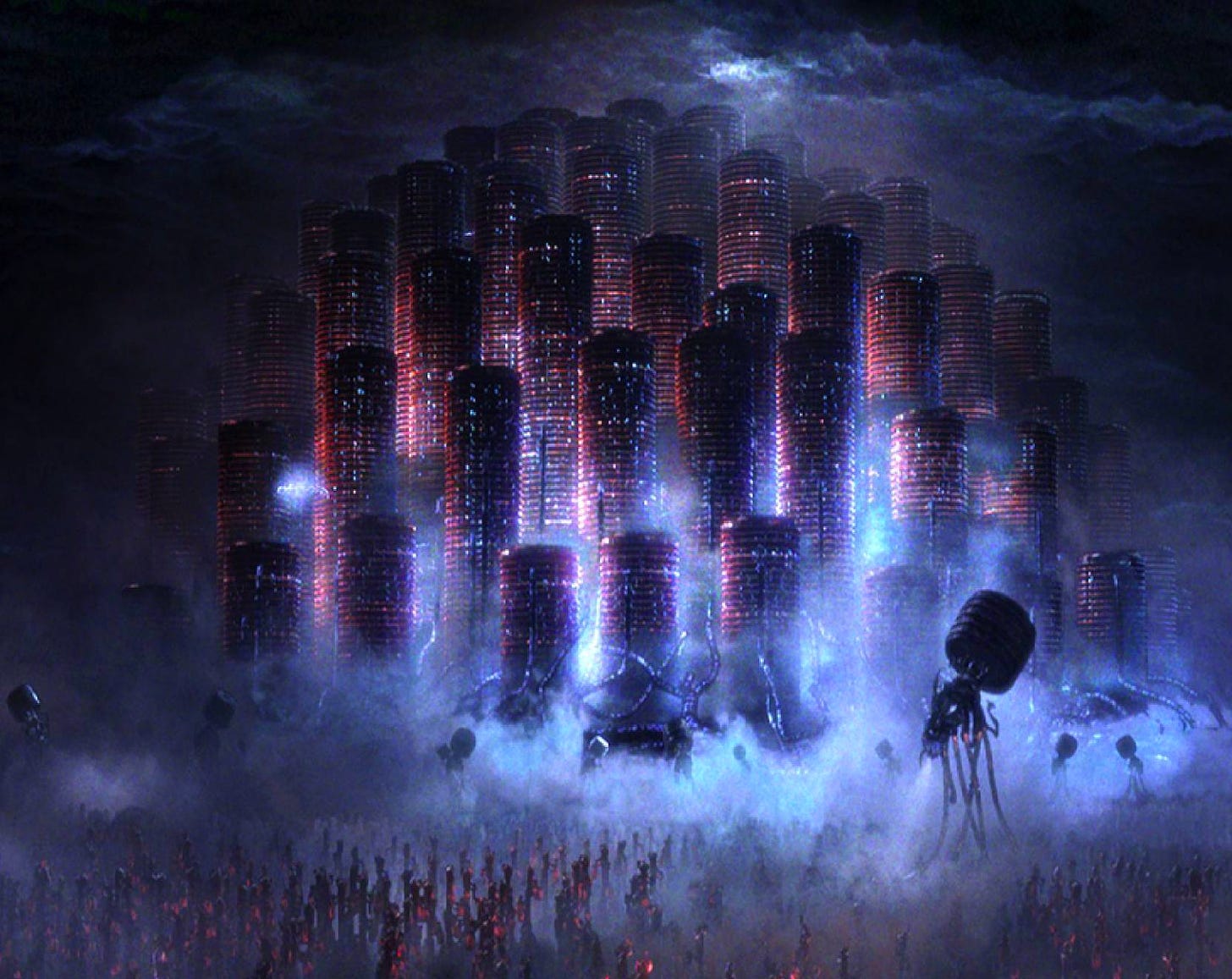
My friend ended by letting me know that he personally thinks ASI will be very hard to accomplish and may not be feasible. But he also noted that he would have thought that what we’ve already accomplished in the last 3 years would have taken 20+ years to achieve and that breakthroughs are happening at a pace that is truly unprecedented.
His final view was that AI was going to change the world in a major way (and soon), and potentially even a dangerous one.
Maybe the dystopian future where robots control everything like “the Matrix” or “Terminator” is actually closer than we think?
Why the Robots May Not Be Taking Over the World (yet)…
Just as I was having this text conversation with my friend, I got an email from my Dad (who works as the Chief Medical Information Officer at a major hospital). He was emailing me about an article we published a few weeks ago on ChatGPT and the career acceleration that can come from being an early adopter of new technology.
His email said something rather interesting that contradicted some of the dire messaging from my tech friend:
“Re: ChatGPT (and AI) – there is a lot of enthusiasm about this new technology but it’s probably worth some caution as well. There are a lot of well documented cases where AI tools don’t work nearly as well as the media or folks on the internet would have you believe at first glance.
I run into this all the time in the medical field where some lay persons are asking ChatGPT for diagnosis help, etc.. There are some significant challenges and inaccuracies with this so we are actually considering blocking ChatGPT in our hospital system environment – at least for now. Certainly AI will continue to grow and develop and improve but in at least some subject areas it is not “ready for prime time” just yet.
This seems like a perfect time to remember the Gartner Hype Cycle”.
I had never heard of the Gartner Hype Cycle before, so I called my Dad up and asked him to explain further. It turns out that it’s an extremely useful model for how to think about new tech waves.
The Gartner Hype Cycle: A Tool for Understanding the Latest Tech Craze
The Gartner Hype Cycle (developed by the renowned tech consulting firm Gartner) is a model used to show how a given technology matures and is adopted across its lifetime.
Here’s a simplified version of what the Hype Cycle looks like:
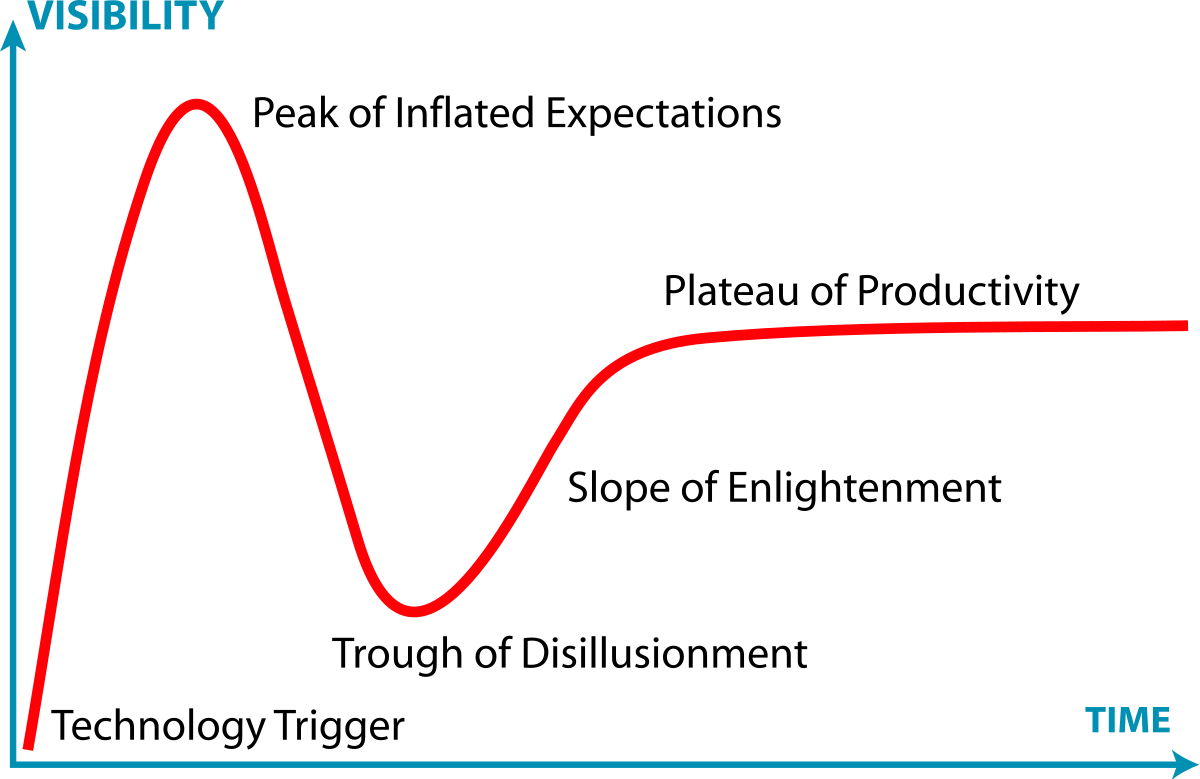
The Hype Cycle Model claims that each new technology passes through 5 main phases during its lifetime (see table below)
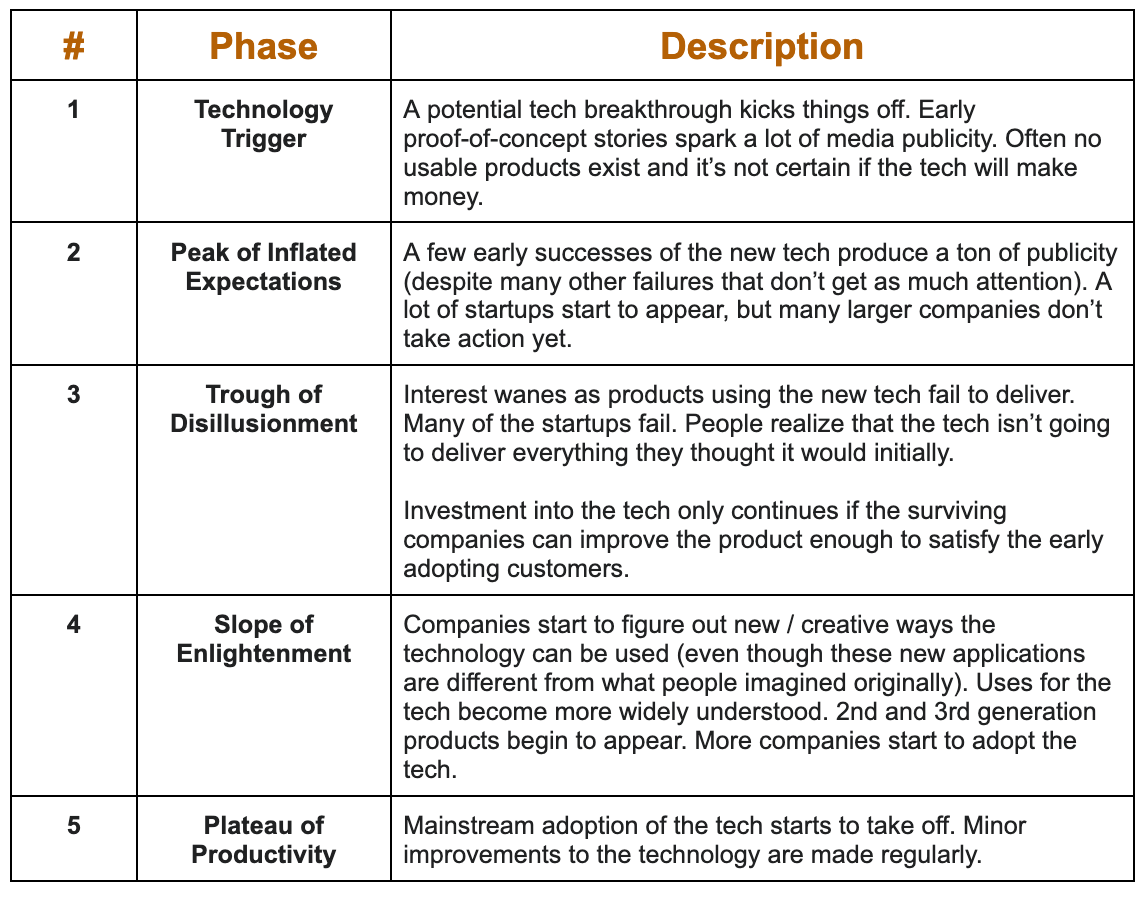
So What Does the Gartner Hype Cycle Mean?
Here’s the main point of the Hype Cycle Model: We often overestimate (sometimes badly) how much a technology is going to change the world. Here is how things usually play out:
- A new technology is invented
- Everyone gets really excited and starts talking about it 24/7. Your Twitter feed and News App constantly has stories on how this is the “next big thing”
- People start flocking into the new tech like crazy. It seems like everyone on LinkedIn is writing about what they think of the new tech, or is trying to get a job at a company focusing on the new tech. Everyone wants to show off how much “in the know” they are.
- A few companies have some early success and become household names. Tons of people buy their stock.
- Months pass. People keep waiting for the “big breakthrough” (Utopia or the End of the World) to happen. And then it doesn’t. Things have changed, but many things seem surprisingly normal.
- Folks start to lose interest and something else becomes the center of media attention.
- Fast forward a few years, and almost without realizing it, you notice that that “big tech” invention is a solid part of your everyday life (ex: everyone suddenly has a smartphone and you never noticed exactly when it happened).
I’ve seen this “hype cycle” play out several times with tech throughout my life. Think of the iPhone, CryptoCurrency, 5G Cell Service, and Electric / Self-Driving Cars, etc… Each time, the technology has seemed incredible, like we’re only a few years away from becoming the Jetsons. And then you fast forward a few years and realize that (A) the world really is different, and (B) the world still seems extremely similar to how it was previously.
If you like this article please share it with others. We’d love your help in growing the Unwritten Business Guide community!
A Quick Story
One of my favorite examples of this is Electric and Autonomous Cars (EV/AV).
A few years ago I attended a lecture put on by a world-famous partner from one of the Big 3 management consulting firms. He was telling the audience about how EV/AV cars were going to completely revolutionize the world in a few short years.
To illustrate his point, he showed these two pictures, taken only 13 years apart:
This was 5th Avenue in New York City in 1900. There is one car in the photo. Everything else was a horse and buggy carriage.
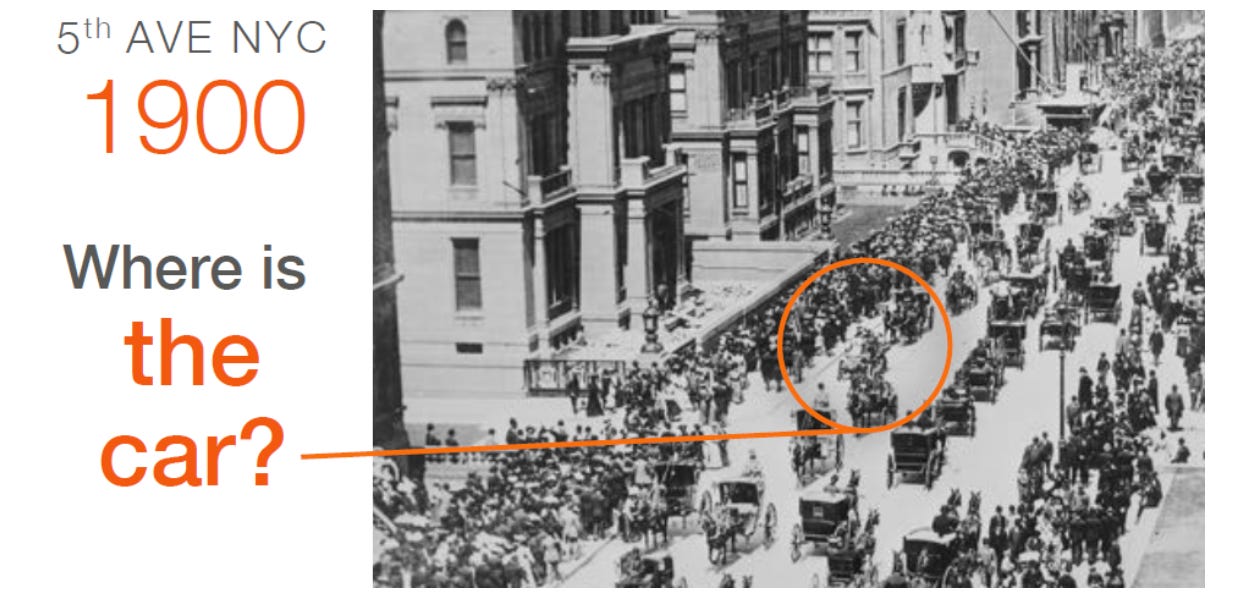
In 1913, it was hard to spot the horse.
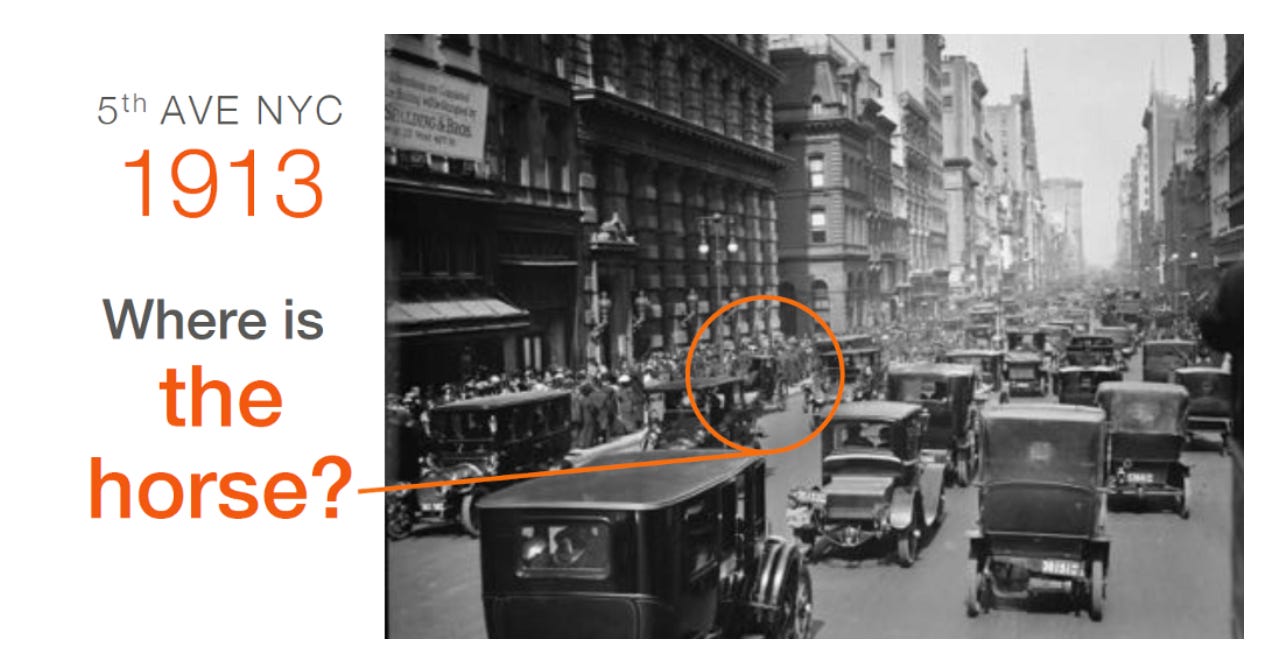
The consultant concluded his lecture by proclaiming that within a few years, we likely would see things like the end of gas & oil cars, every car on the road would be self-driving, and even parking lots would disappear as fleets of self-driving cars would be maintained & serviced outside city limits.
I’ve thought a lot about that lecture every time I pass a Tesla on the highway. I think ultimately the consultant was both right and wrong. There certainly are more EV/AV vehicles than ever before (and are certainly more to come), but many of his dramatic predictions (like the end of oil & gas vehicles) seem extremely unlikely (if not impossible) now.
If the consultant had been familiar with the Gartner Hype Cycle he may have taken some pause and realized that there was a good chance that EV/AV technology is in the “peak of inflated expectations” stage and that he needed to dial-down his expectations for what was going to happen in the coming years.
So Are the Robots Not Really Coming?
As I’ve been thinking about AI, I think 2 things are paradoxically true:
1. I think that AI really is going to change the world. We’ll have some version of the “New York Streetcar” photo in 13 years (or less!) that shows how different the world is now that AI has become mainstream.
2. That change will somehow seem much more normal and less “Jetson-like” than we expect. AI will change the world, but it may take longer than we expect, or will change it in ways that will seem mundane/commonplace to us in a relatively short period of time. Think of how revolutionary the iPhone, the internet, or electric vehicles truly are, and yet how we just accept these as part of modern life now and are rarely in awe of them anymore.
If the past is anything to go by, it does seem that we’re right about here on the AI version of the Gartner Hype Cycle.
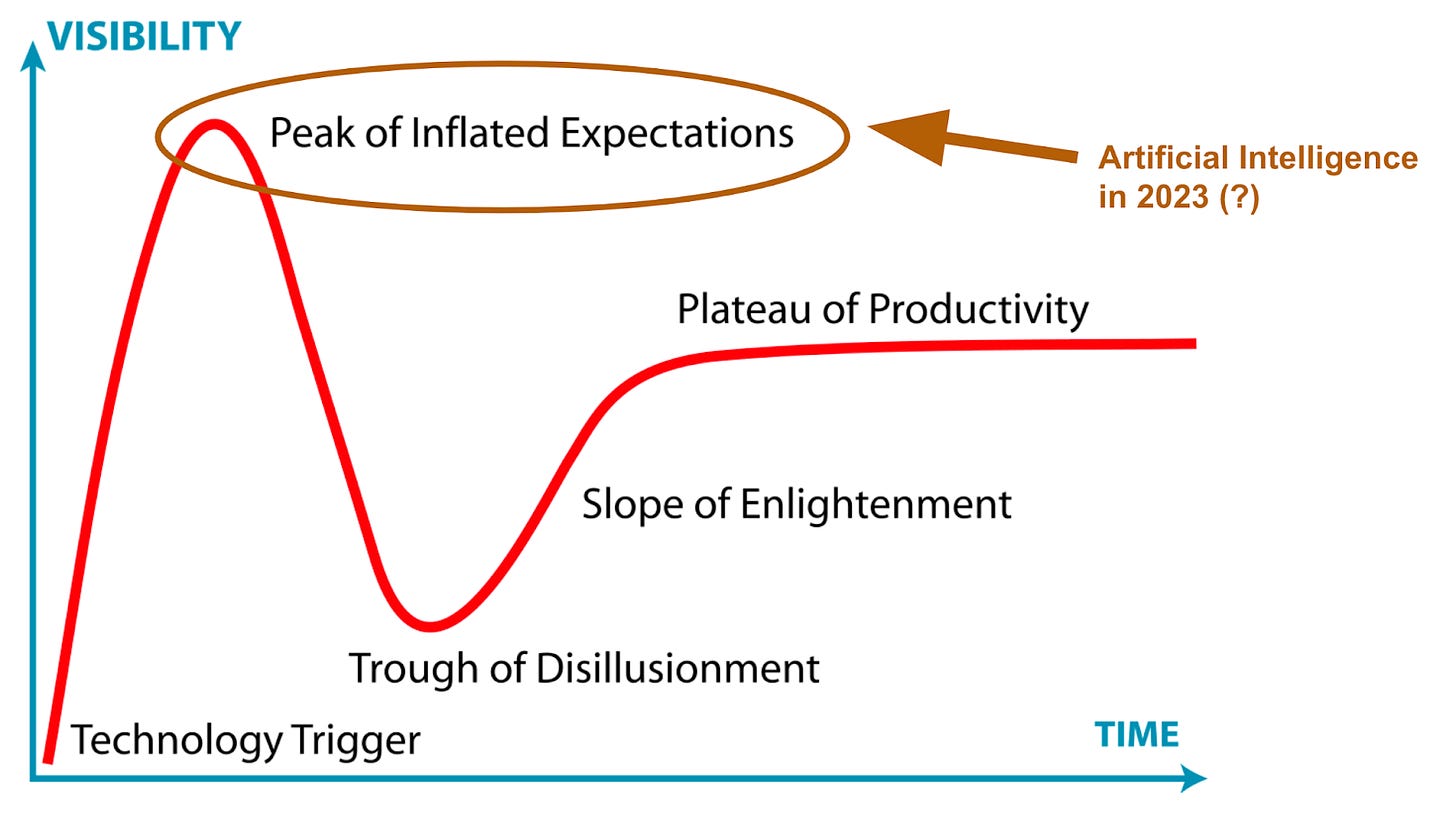
Most people are probably overestimating both AI’s strengths and weaknesses. Things rarely turn out as good or bad as we exaggerate them to be in the early days. Keep a balanced perspective. Remember that any given new tech is unlikely to either usher in utopia or result in the end of the world. We may have to leave the Matrix to the movies.
I think it’s wise not to become overly exuberant about a new technology (aka, don’t believe all the hype), even one as exciting as AI. However, we should also be wary of underestimating a new trend as well. No one wants to be the last horse buggy company in 1913, and no one will want to be part of the last company that hasn’t adopted AI in 2030 either.
I for one, am not planning to quit my job anytime soon to start an AI company, but I do plan on finding ways to adopt AI to make my life better. It’s definitely a tech skill worth learning now so you can reap the benefits.
P.S: If you’re interested in a more detailed view of the Gartner Hype Cycle (with all of the steps involved in a technology’s life cycle) check out the model below
